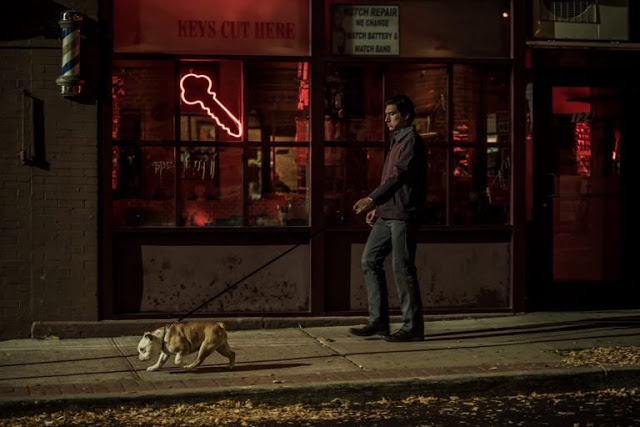Within the past year, there have been three major motion
pictures built around poets and poetry – Jim Jarmusch’s Paterson, Pablo Larrain’s Neruda, and Terence Davies’ A Quiet Passion, a biopic of Emily
Dickinson played by Cynthia Nixon. Only in the first of these is the poetry –
penned by Ron Padgett but assigned in the film to a Paterson, NJ bus driver
likewise named Paterson – really what the film is about. In each, the question
of the writer’s relationships is central to the film’s scope and development,
and to some degree one could read these films as different studies in what
happens when a human being takes on this mysterious second skin as a writer of
verse.
Paterson, which is
about a fictional writer in the downscale industrial suburb of New York that
looks nostalgically to its poetic heritage (as well as to comic Lou Costello)
for a last, lingering sense of worth, is constructed around one of the sweetest
relationships in recent film, between Adam Driver’s quietly brooding Paterson,
a meditative-to-depressive soul who doesn’t say a lot, and his perpetually
optimistic starter-of-a-million-creative-projects girlfriend, Laura
(Goldshiftah Farahani), a gal who comes with her own color scheme. This may
well be Adam Driver’s best film performance, and you can see and sense him
writing as he overhears conversations in the course of daily life.
The relationship in Neruda
is less between the poet and his partner Delia del Carril (Mercedes Morán) than between
Pablo and Óscar Peluchonneau, the Director General of Police Investigations charged
with bringing Neruda in during one of Chile’s periodic neo-fascist periods in
the 1940s. Played by Gael García Bernal as a noir cop – more a wannabe Bogart
than a Broderick Crawford – Peluchonneau becomes obsessed with his target, who
rouses opposition to the crackdown by refusing to escape the country,
preferring instead to visit the brothels that are portrayed here more as
nightclubs for intellectuals with half-naked ladies there for the fucking.
Pointedly, when Carril suggests getting pregnant as a means of defying the
regime, Neruda (who in “real life” had one son he didn’t see after his Dutch
first wife went back to Europe) heads straight to the brothel where everyone
interrupts what they’re doing to watch him read.
A Quiet Passion is
more disciplined in its treatment of its poet, but not a lot. The screen play with
its consciously stilted dialog presents the role of 19th century
bourgeois women as nearly as constrained as that of The
Handmaid’s Tale, which it suggests is very much the way Dickinson herself
wanted it. Gradually the poet reduces her contact with men to her brother
Austen, whose affair with Mabel Loomis Todd is treated entirely from the
perspective of Dickinson’s negative reaction. Notably absent is her most
important male relationship, with Thomas Wentworth Higginson, who is not
mentioned once. A viewer can be forgiven for not suspecting that Higginson and
Todd were the editors who first made Dickinson famous. In standard Hollywood cliché,
we see Dickinson writing with Nixon’s off-screen voice-over augmented by music
to signal its quality.
Were it not for Nixon’s superb performance playing a
prickly, brittle personality who is becoming just a little crazier by the year,
but who dies of Bright’s Disease before she can get to mad-woman-in-the-attic status,
there wouldn’t be much to see in A Quiet
Passion. Neruda is not García Bernal’s best work and there is not enough
focus on Luis Gnecco’s Neruda, period. But I could watch a nine-hour version of
Driver guiding his bus, going to the local tavern, straightening his mailbox,
sleeping beside Laura, penning patient little poems one word at a time. Oddly
enough, the fate of Driver’s poems is more of an issue in the Jarmusch film
than Dickinson’s in Passion. But
then, for Jarmusch, they’re real poems. And that makes all the difference.
In each case, the film’s tension is at least in part between
a figure and this other thing they are involved with beyond any relationship,
as if poetry were a code for any kind of interest in a serious pursuit outside
of the conjugal bed. Paterson could be making whirligigs for all it matters:
his interest in the poem doesn’t compete with his love for Laura any more than
her painting the shower curtains competes with hers. Neruda as played by Gnecco is self-important, far more readily a politician than a poet, but also an inspiration to the popular resistance. His
partner’s self-abnegation is an effect of a cruelty he’s not even conscious of.
But tellingly this is not a film about the poet and his partner so much as it
is about Bernal’s unrequited desire for his suspect, the homoerotics of detective work. Dickinson on the other
hand makes a point, repeatedly, of turning away from relationships, to the
point that she stops seeing outsiders at all. You wouldn’t know from this film
that two-thirds of her poetry was written before she was thirty-six, and that
her final two decades were much less about her writing than the decades before.






